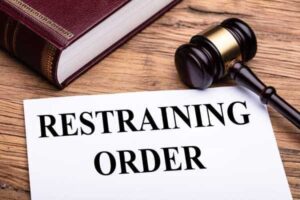Compassionate Family Law and Restraining Order Lawyers Fight to Protect Clients From the Impact of Domestic Violence in Family Law Cases in El Paso County, Teller County, Pueblo County, and Throughout Colorado
In civil cases, a protection order may be used to block two or more people from making contact or carrying out activities that may constitute a public nuisance. However, when used in a criminal case, these court injunctions are meant to prevent one person from harming another individual by prohibiting either behavior or movement that would likely bring these two people into close contact with one another. If you or a loved one require legal protection from domestic abuse, contact a dedicated Colorado Springs family law and protection orders attorney at Brighter Day℠ Law to help you navigate every aspect of your legal journey, from protection orders to divorce, child custody, and more.
One major feature of protection orders is the restrictions on the distance one party is allowed to be from the other party. For instance, a party may be restricted to remain at least 300ft from the other party. And this only implies that should the person being restrained fail to adhere to this condition, he/she will be penalized. Another notable feature is the limitations on making direct contact through email, over the phone, or by any other means.
What Exactly is a Restraining Order?
Also, referred to as protection orders, restraining orders are court injunctions that are meant to prevent a specified party, known as the protected person, from any form of abuse or harassment by another party, known as the restrained party.
How Do I File A Protection Order?
If you are the victim, a protective order provides you with security and much-needed peace of mind. However, if you are the restrained party, it can impact your relationships and overall well-being. This only implies that if you opt for self-representation during this critical court hearing, you’ll be putting yourself at even much greater risk. This is one of the compelling reasons why you would want to seek the services of an experienced Colorado Springs protection orders attorney.
With a highly experienced and knowledgeable protective order attorney at your disposal, you can rest assured your legal rights will be protected at all times. Family law is a highly complex subject and requires the intervention of a professional who is highly knowledgeable in this area of the law and has lots of experience navigating local courts. This is when you’ll stand a chance of getting a favorable result.
If you have been served with a restraining order, know that you too, have rights. According to the law, you must be officially served with a restraining order. At the same time, you have a legal right to file a response concerning the allegations made by the party petitioning for the protective order. Upon receiving the restraining order, you have up to twenty days to file a response before a court hearing. Even though you can’t request the court to deny the order, the judge can make certain modifications or changes to the order upon your request.
Do I Need a Colorado Springs Family Law and Protection Orders Attorney to File a Restraining Order?
You don’t necessarily need a lawyer to file a protection order. However, working with an experienced lawyer can be hugely beneficial because these experts boast specific experience with legal protection orders.
A good lawyer knows and understands what it takes to obtain a restraining order. Legal representation for obtaining a restraining order can be especially advantageous if kids are involved, or if the other person is already working with a lawyer to fight or get a protection order.
Victims of domestic violence, assault, or abuse are usually granted immediate protection. It is important to note that the duration, as well as the terms of no-contact orders in these scenarios, are determined by the judge depending on the circumstances of the crime and the accused person’s criminal background.
Get Advice From An Experienced Family Law and Protection Orders Attorney. All You Have To Do Is Call 719-733-9129 or Fill Out Our Case Evaluation Form.
Understanding the Law on Restraining Orders
In criminal situations, protection orders are broadly a consequence of the charge itself. Under Colorado law, there is a minimum requirement for a protection order. This order states that the suspected party should not molest, harass a victim or witness or interfere with the evidence of the acts charged. It is worth noting that the alleged violation of this particular protection is a serious offense that should preferably be handled by an experienced legal expert.
Restraining orders are equally used in DWAI/DUI cases as well as other alcohol-related cases. They ban a person against using or possessing alcohol or any other illicit substances. Furthermore, a protection order can prevent the accused from possessing a firearm.
In juvenile cases or domestic violence (spousal abuse), restraining orders will prevent parties from residing in the same home together, regardless of whether that particular house has been the accused’s home before the domestic violence accusations. And if you find yourself in such a situation, you’ll be wondering how you can get back to your house. Your best bet toward achieving this is to work with a reputable and experienced Colorado Springs family law and protection orders attorney.
What Can a Restraining Order Prevent?
- Stalking
- The threat of physical harm
- Family violence
- Assault
- Emotional abuse
In the state of Colorado, a protective order can be issued in municipal, county as well as district courts, under C.R.S 13-14-102. The standard for the issuance of the order is generally for reasons of the threat of harm or impending harm. Because of the permanent implications of divorce/custody cases, coupled with their delicate nature, it is very common for protective orders to be filed at the start of divorce or child custody cases.
In the last few years, the purpose of restraining orders has somehow shifted toward obligating the accused individual to continue catering for the bills or making other financial assistance payments as long as the order is valid. Such a change was necessary bearing in mind that financial control has today become another common cause of domestic violence.
Temporary vs. Permanent Restraining Orders
A TRO, or temporary restraining order, is usually granted by a judge after a hearing with just the party asserting to be in fear of her/his safety. A TRO only works for about two weeks, after which a scheduled permanent restraining order hearing must be set. In this regard, the accused (defendant) must be personally served with the temporary order and informed about the hearing. Besides, the plaintiff should file an affidavit of service with the court.
PPO, or permanent protection order, is strikingly similar to its TRO counterpart but doesn’t have an expiration date. A PPO can prevent the defendant from accessing the plaintiff’s place of residence, work as well as public places commonly frequented. It is also worth mentioning that if a protection order involves married parties who live together, the defendant will be kicked out of his/her home completely.
After the hearing of PPO, the defendant to the protection order can rightfully contest the charge. In Colorado, the plaintiff has the burden of truth and a reputable defense attorney can convince the court, that is how things are!
How Can I Defend Myself Against a Restraining Order?
As previously mentioned, defending against a protection order can be a difficult and intimidating task. You need to equip yourself with a proven restraining order lawyer. One major obstacle to defending against a protection order is that they often tend to accompany potential or actual criminal charges, particularly for domestic violence.
Bearing in mind that the likelihood of a restraining order being accompanied by a criminal investigation is usually high, the question now becomes, how can you defend yourself against these allegations without incriminating yourself? In simple terms, a decision must be reached as to whether the respondent to the protection order should testify against the protection order or not. As you can see, this decision is a critical one and will require the intervention of a knowledgeable and experienced protection order lawyer.
Of course, the respondent is always going to be his or her own best witness, depending on his or her ability to testify to the relevant circumstances and events. However, the prospect of testifying on your own will only subject you to cross-examination by the other person or party. If you didn’t know, one major problem that comes with testifying under oath and cross-examination is that there is a huge risk of you saying something that can potentially be used against you in criminal prosecution. In short, you are better off having a good protection orders attorney at your disposal.
Contact Us Today At 719-733-9129 To Get Quality Legal Representation For A Protection Order And Your Related Family Law Issues.
How Effective Are Protection Orders When It Comes To My Safety?
Below is some critical information that you should know regarding protective orders.
Protective orders should be your first line of defense against any form of abuse. However, even after having this particular order in place, you shouldn’t just stop there! There are other important things you can do to enhance your overall safety. Work with a reputable attorney to advise you accordingly. Depending on your situation, your attorney may advise you to perhaps file for divorce from the abuser or have your abuser stripped of his visitation or custody rights.
It is also imperative to note that protection orders can sometimes have a complete opposite of the intended impact. If you didn’t know, there have been cases where an abuser becomes increasingly motivated to contact a victim even when an official restraining order has gone into effect. If you or someone you love are experiencing this type of scenario, you are highly advised to take immediate action by contacting the authorities. Contact your local police department to ensure that the restraining order is adhered to accordingly, and the abuser is charged for violating this order.
Contact A Qualified Colorado Springs Family Law and Protection Orders Attorney Today
At Brighter Day℠ Law, we are a team of highly experienced, knowledgeable, and compassionate lawyers who always strive to ensure that all violence victims win the battle against their abusers. We are motivated to offer unrivaled comprehensive legal support to their heroic moves.
Our legal company cares about the overall well-being of our clients, and this allows them to seamlessly navigate every aspect of their legal journeys, ranging from divorce actions, protection orders, debt and asset division, child custody, and more. Don’t wait any longer! Call a Colorado Springs family law and protection orders attorney from our firm today and we will be more than happy to help you win this battle.












